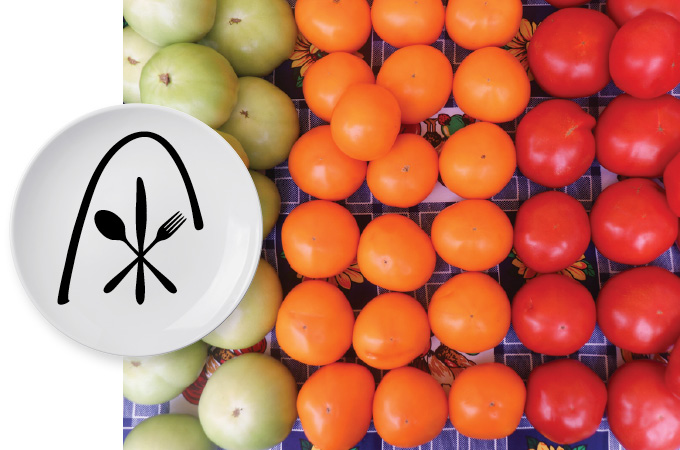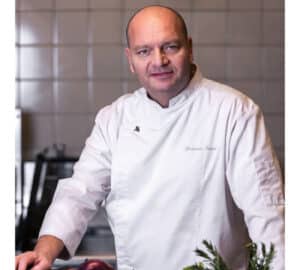Whether you’re missing some favorite foods or just thankful for what you can find, we’ve all been thinking a lot more about what’s on our plates. Grocery stores and dinner tables are not immune to COVID-19. T&S reached out to experts in the local food industry to learn a little about the impact on farming and distribution in St. Louis.
impact on farmers
Chris Eckert of Eckert’s Country Store and Farms says that farming during the pandemic has been surreal. “The crops and weather don’t know there’s a pandemic,” he notes. “Many elements of our business are continuing as normal. The challenge is keeping everyone healthy.” New safety measures include more intensive cleaning schedules, limited passengers in vehicles, and mandatory face masks and gloves. “We’ve also implemented a stricter policy for sick leave,” he adds. “If people aren’t feeling well, we’re offering to pay them while they’re home.”
A major impact has been on events held at the farms. Molly Rockamann, founding director of EarthDance Organic Farm School, says COVID-19 is affecting its apprenticeship program since students can’t meet. “We’re offering Zoom classes and doing field walks via Facebook,” she explains. It’s pick-your-own season at Eckert’s, but there are concerns about crowds. “We need to adapt our harvesting practices,” Eckert says. To address the situation, the farm will hold an event where people can safely get freshly picked strawberries while social distancing.
“We’re grateful and humbled by the outpouring of support we’ve received,” Eckert says. “We want to give back to the community.” Eckert’s has been partnering with organizations like Operation Food Search to support local businesses and feed those in need. Similarly, EarthDance has set up a pay-what-you-can, drive-thru produce stand. “We’re also donating a lot more to local food pantries and organizations that prepare hot meals for people in the community,” Rockamann says.
reaching consumers
While farmers are adapting to the ever-changing situation, one of the major issues they face is how to get their produce to buyers. Patrick Horine, co-founder of the Tower Grove Farmers’ Market, says most local growers aren’t dealing with supply issues. “Farmers had their crops planted well before the pandemic, so they are looking at a production on scale with a normal year,” he explains. “The challenge moving forward is making sure there is a marketplace.” Rockamann adds that EarthDance usually sells at the indoor farmers market in Ferguson and to local chefs, but neither are options right now.
As they reopen, local farmers markets in the area are implementing new procedures in order to keep everyone safe. Horine was involved in planning the reopening of The Boulevard’s Farmers’ Market. While a drive-thru market and curbside pick-up were originally considered, it ultimately was decided to use a modified walk-up model. Vendors are kept to one side of the street, face masks are required and patrons must maintain 6 feet from each other.
The Tower Grove Farmers’ Market also has started delivering food boxes with produce and meat that can be ordered online. “It’s allowed us to work with vendors who don’t have an outlet right now,” Horine explains. He says delivery will likely continue in order to accommodate both sellers and buyers who can’t make it to physical markets even after they reopen.
local focus
The pandemic has increased interest in produce grown in St. Louis and surrounding areas. “COVID-19 has shown us the importance of strong local food industries,” Horine says. “So many products travel thousands of miles. When the supply chain is disrupted, you have to rely on what’s available in your area, but these infrastructures take time to cultivate. Coming out of this, I hope we see more robust local food systems across the country.”
During the current crisis, local produce offers a safer alternative for grocery shopping, according to Rockamann. The food is handled by less people, and pick-up often can be arranged, so buyers can avoid braving lines and crowds at stores. “A local food system also benefits the economy in the region; money stays in the community,” she says. “And beyond safety and economic benefits, there is something rewarding about knowing where your food comes from.”
Rockamann also adds that more people are interested in growing their own produce right now, and while they may not have the time to continue the practice next year, she expects a preference for fresher food to continue. “When I started farming, I thought I would never be able to eat a store-bought apple again; the difference is night and day,” she explains. “Once you’ve converted to freshly picked food grown in living soil, you won’t be able to go back if you can help it.”
Featured image courtesy of Tower Grove Farmers’ market








